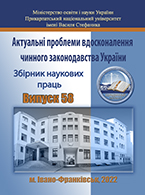To the question about the peculiarities of the methodology of the theoretical and legal analysis of the Regulation of the Verkhovna Rada of Ukraine.
DOI:
https://doi.org/10.15330/apiclu.58.134-157Keywords:
Regulation, Verkhovna Rada of Ukraine, methodology, normativism, postpositivism, general philosophical methods, general scientific methods, special scientific methodsAbstract
This article analyzes the existing methodological approaches to understanding the legal nature of the Regulation of the Verkhovna Rada of Ukraine, their criticism from the standpoint of post-positivist scientific methodology, and the construction of an optimal approach on this basis, within the framework of which it seems possible to comprehensively understand and adequately reflect the main legal characteristics of the specified legislative act, in the unity of its phenomenological, normative, functional and axiological elements. The opinion is substantiated that the application of a number of general philosophical, general scientific and special scientific methods to the study of the legal nature of the Regulation as a special codification act, designed to systematize the legislative regulation of parliamentary procedures, allows to characterize its legal nature and place in the system of national legislation in various ways, significantly supplementing traditional scientific data, after reviewing some conclusions, and updating the content of scientific knowledge about the Regulation and its legal features. It was found that, taking into account the current state of domestic jurisprudence, the post-positivist methodological paradigm, centered around anthropological, phenomenological and axiological approaches, which pays more attention to the development and implementation of the latest legal technologies of rulemaking and law enforcement, is the optimal scientific toolkit for learning the legal nature of the Regulation and also draws attention to the understanding of the sociological and legal aspects of legislative policy, the interaction of the parliament and the public regarding the implementation of key elements of this policy, strengthening the flexibility and stability of regulatory procedures, their early updating and adaptation to the changing conditions of political and legal reality. Emphasis is placed on the fact that such a methodological paradigm is able to provide not a mechanistic, but a dialectical combination of such scientific techniques and ways of analyzing the Regulation, which would take into account the latest developments in the field of development and modernization of modern models of parliamentarism, allow an open and non-committed view of the trends of the parliamentary process, and also contributed to the formation of the modern doctrine of the Regulations based on the preservation of rational elements of the regulatory regulation of parliamentary procedures and the adaptation of domestic parliamentarism to the best European parliamentary legal traditions, values and practices.


